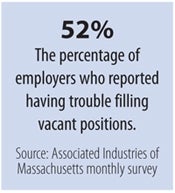John Stowe, president of the Worcester-based manufacturer Lutco Inc., has been trying to fill some open positions. And amidst a statewide unemployment rate hovering around 8 percent, he thought the task would be simple.
But Stowe said that managers at his company had trouble finding applicants that they perceived as qualified for the manufacturing positions, even with approximately 288,000 people unemployed in this state.
“It’s harder and harder to get people who come with the tribal knowledge of manufacturing,” Stowe said.
A Wide Margin
The Associated Industries of Massachusetts, a nonprofit association of employers, reported recently that Stowe is not alone.
In fact, 52 percent of the employers that responded to its March survey reported shortages of qualified workers when trying to fill open positions.
The majority of the survey respondents were from the manufacturing sector, according to Andre Mayer, who is AIM’s research director.
Mayer said that he found the results surprising.
“We knew there were issues out there,” Mayer said. “We were surprised it was such a high proportion of our members.”
Concerns about a lack of skills among the manufacturing workforce seem to always be present to some extent, Mayer said.
But March was the first time that AIM had asked its members about the subject, so it’s difficult to say if the sentiment has grown stronger over time.
Mayer said that a number of factors could be causing the problem.
The recession has created long-term unemployment for many workers, making them rusty and behind the quickly changing curve in their industry, he said.
And he said companies have more drastically changed their operations in order to survive, possibly merging several positions into one, in which the person who holds that job must have a wider range of abilities.
Some employers also complained to AIM about a lack of training opportunities for potential employees, including training in speaking, writing and reading English.
Stowe, of Lutco, said he thinks that the recession played a strong role in the current hiring situation in his industry, by “washing out” employees who may have since moved to other types of jobs.
Manufacturers are slimming down their operations in the wake of the recession and striving for more efficiency, and Stowe said that jobs that employers previously thought necessary may not be any longer.
So employees who had risen through the ranks at companies and were then laid off during the recession may find that their jobs are not coming back.
“Those people may have to get a job doing something else,” Stowe said.
Unintended Consequences
Some employers also told AIM that for some job candidates, they thought unemployment insurance was acting as a deterrent to returning to the workforce.
Stowe said he recently offered an applicant a 90-day temporary position with the chance of a more permanent position after those three months.
The applicant turned him down, opting to remain on unemployment, which lasts longer.
“It dis-incentivizes people,” Stowe said.
Unemployment insurance is also expensive for employers. Stowe said he would rather that his money goes toward training new employees.
But while employers may lament a shortage of necessary skills, the fact is that most employers are not desperate to hire right now, Mayer said.
Until the economy gets stronger, companies will remain selective about who they hire, placing an emphasis on workers who can step right into the position with little training, he said.
Some may choose to subcontract some work when necessary rather than hire an employee, he said.
It is a stark contrast to a decade ago, when unemployment was as low as 3.9 percent and some companies were recruiting from prisons, Mayer said.
For now, he said, employers will remain selective about who they hire.
So the worker who is unemployed for six months or longer will likely have a harder time getting back into the workforce.
“Your skills deteriorate,” Mayer said. “Not only are you out of practice, but the industry has moved on.”

